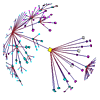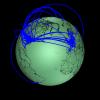[an error occurred while processing this directive]
Tamara Munzner: Software
Tamara Munzner: Software
-
-
HypViewer is the 3D hyperbolic module used in Site Manager below,
now available for free noncommercial use. Contact SGI for licensing for
commercial use.
- [Download source or binaries (Linux, Irix, Windows)]
-
-
Site Manager is free software from Silicon Graphics for webmasters
and content creators. It includes a 3D hyperbolic view of the link
structure of the target web site. That module is an implementation of
the layout described in my InfoVis 97 paper.
Version 1.1 includes the guaranteed frame rate drawing algorithm
described in my Graph Drawing 98 paper.
- [Download]
-
-
I was one of the core team responsible for design, implementation,
documentation, distribution, and maintenance of Geomview, a public
domain 3D interactive visualization package with over one thousand
registered users. We encourage people to let us know how they use our
tools, and have heard back from hundreds of them in a wide variety of
domains, including topology, computational geometry, computer
graphics, robotics, medical imaging, nuclear physics, mechanical
engineering, civil engineering, biomechanics, spacecraft design,
computational electromagnetics, and seismology.
- [Download] version 1.8
- [Download]
previous versions from former
Geometry Center home
-
-
The Triangle Tiling museum exhibit allows people to explore the
connections between symmetry groups, tiling, the Platonic and
Archimedean solids, and non-Euclidean geometry through interactive 3D
graphics. I adapted research software originally written by Charlie
Gunn for museum use with Stuart Levy and Olaf Holt. The program
features mathematical concepts such as the relationship between
Platonic and Archimedean solids, duality, and spherical geometry. The
adaptation was done in collaboration with the Science Museum of
Minnesota, where it is on exhibit. The software was also shown at
``The Edge'', the interactive installation showcase at SIGGRAPH 94.
There's an article
about it in the Geometry Forum archives.
- Download:
- OpenGL SGI binaries
-
IrisGL SGI binaries (Irix 4.x or earlier)
-
Mac and Windows binaries ported by Jeff Weeks, who added additional
functionality and named it KaleidoTile.
- Linux
port created by Pedro Ribeiro for the Atractor exhibit in Lisbon. This
version is also multilingual: you can switch the interface between
English, French, German, Italian, Portuguese, and Spanish. (Note: if
you have troubles running on your machine, try downloading
Geomview 1.8 and
substituting that bin/gvx for the one in this distribution.)
-
-
I was involved in the VRML 1.0 standards process starting in 1994,
when integrating 3D with the Web was a hot new topic. The WebOOGL
software was a proof of concept to back our format proposal. After SGI
Inventor-based proposal won the vote (ours came in second), we
retro-fitted the WebOOGL software into a quasi-compliant VRML 1.0
viewer. Development has not continued since I left the Geometry Center
in 1995, and it is rather unlikely that any 2.0 support would ever be
added. My mathematical
zoo page has seen a lot of traffic since it was part of the
original content pages highlighted during the first big VRML browser
release in March 1995. It contains files in both VRML and the WebOOGL
native 3D format.
-
Download
if you're curious, but this software is not currently supported.
-
-
The CAIDA toolset for network drawing was written by Eric Hoffman and
me. Some aspects of it are described in a paper on visualizing the MBone. These
tools were used to create a series of short videos, including the Planet Multicast video. The toolkit can also be
used to create Web pages like the MBone or the NLANR caching
hierarchy daily pages, which contain automatically generated 3D and 2D
snapshots of the day's data.
- Download a
preliminary release.

 Tamara Munzner
Tamara Munzner
Last modified: Thu Aug 1 18:20:22 PDT 2002
 HypViewer 1.0
HypViewer 1.0
 Site Manager 1.1
Site Manager 1.1
 Geomview
Geomview Triangle Tiling
Triangle Tiling WebOOGL
WebOOGL
 Caidants
Caidants
 Tamara Munzner
Tamara Munzner